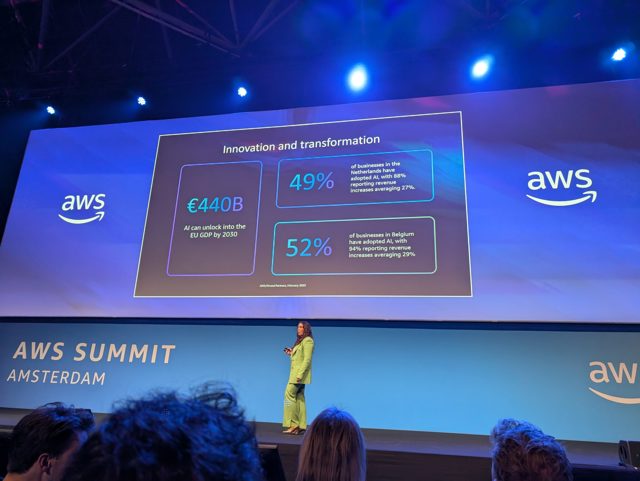< Back to news
Colleges to work together with AI hubs
Sharing knowledge and experiences pilot
Follow-up
More information 


28 December 2023
Results of pilot programme Learning Communities around AI
As a system technology, AI has a major impact on a wide field of sectors and the people working in them. Developments follow each other in rapid succession and the market requires new knowledge and proper trained people all the time.
The demand for AI talent is growing so fast that the outflow from mainstream education cannot keep up with this pace. Even for professionals already working, the impact of AI makes it necessary to undergo substantial and regular training.
Learning communities around AI focus on the optimal connection between the labour market, research and education. Jointly tackling applied AI use cases is central to this, with education, applied and practice-oriented research going hand-in-hand. This helps innovative SMEs and institutions to make use of AI.
Colleges to work together with AI hubs
Myrna van de Water, the Applied AI Learning communities programme manager on behalf of lecturer platform PRIO: "With a kickstart project from the Dutch AI Coalition, six universities of applied sciences together with early adaptors from SMEs and public organisations, including governments, researched how to take up a challenge. For example, the energy transition in the built environment." The pilot with learning communities provided an opportunity to learn a lot from practical experience about how learning communities work and the importance of regional embedding.
Sharing knowledge and experiences pilot
An overarching, coordinating programme shared and secured the knowledge and experiences from the six trajectories. This programme was implemented by the umbrella lectors' platform for Practice-Oriented ICT Research, PRIO, with Windesheim as the lead and coordinator.
Erik Fledderus, lecturer Digital Business & Society at Windesheim and chairman of PRIO: "In the programme, the six cooperating colleges of higher education examined what common denominators they see in the application of AI. Such as certain actors, preconditions and tools, but also how AI can be used responsibly. With the aim of discovering together how to set up such a learning community. What are success factors and how useful are various models previously developed for learning communities in practice?"
Erik Fledderus, lecturer Digital Business & Society at Windesheim and chairman of PRIO: "In the programme, the six cooperating colleges of higher education examined what common denominators they see in the application of AI. Such as certain actors, preconditions and tools, but also how AI can be used responsibly. With the aim of discovering together how to set up such a learning community. What are success factors and how useful are various models previously developed for learning communities in practice?"
Concrete results
The aim was to develop widely applicable practical tools, instruments, a case study for education and training from the experiences. The results of the completed pilot programme are summarised in an overview that you can consult here: Results of the Applied AI Learning Communities Pilot. In it, the research and learning experiences are explained and focus points and advice have been formulated. We would like to invite you to take note of this public summary.
Follow-up
The learning experiences and results of the pilot programme have been shared with the Human Capital working group and presented to AiNed. The learning communities approach is part of the AiNed National Growth Fund programme developed by the Dutch AI Coalition. We will keep you informed via the NL AIC and AiNed website. In addition, the results will also be presented at the event organised by PRIO on 24 January 2024, click here if you want to register for this.
Programme funding
The total amount for the pilot programme was 850,000 euros. Most of the programme was funded from the kickstart budget that the Dutch AI Coalition received from the Ministry of Economic Affairs and Climate. Regieorgaan SIA provided the other part of the funding and implementation of the scheme.
More information
Interested in learning communities? Then visit the Human Capital working group of the Dutch AI Coalition, consult the overview with the results of the pilot, read more on the website of the Learning Communities Network or consult the information on the website of the AiNed programme.
This article was published on the website of the Dutch AI Coalition.
© NL AI Coalition
© NL AI Coalition
Vergelijkbaar >
Similar news items

April 16, 2025
AWS: Dutch businesses are adopting AI faster than the European average
New research from AWS shows that Dutch businesses are rapidly adopting AI—at a rate of one new implementation every four minutes, well ahead of the European average.
read more >

April 16, 2025
Submit your nomination for the Dutch Applied AI Award 2025
Do you know or develop an innovative AI application? Submit it now for the 2025 Dutch Applied AI Award, presented at the Computable Awards.
read more >

April 16, 2025
UK government tests AI to predict murders
The UK government is developing an AI system that could predict who is most likely to commit a serious crime. Critics call the project dangerous and discriminatory.
read more >